外研版(2019)选择性必修第一册Unit 1 Laugh out loud! Using language 课件(35张ppt))
文档属性
| 名称 | 外研版(2019)选择性必修第一册Unit 1 Laugh out loud! Using language 课件(35张ppt)) |

|
|
| 格式 | zip | ||
| 文件大小 | 1017.1KB | ||
| 资源类型 | 教案 | ||
| 版本资源 | 外研版(2019) | ||
| 科目 | 英语 | ||
| 更新时间 | 2022-10-31 00:00:00 | ||
图片预览

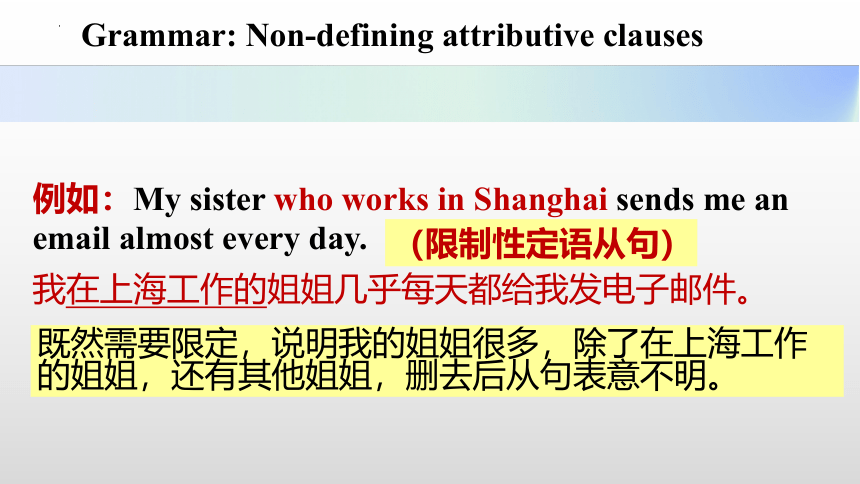
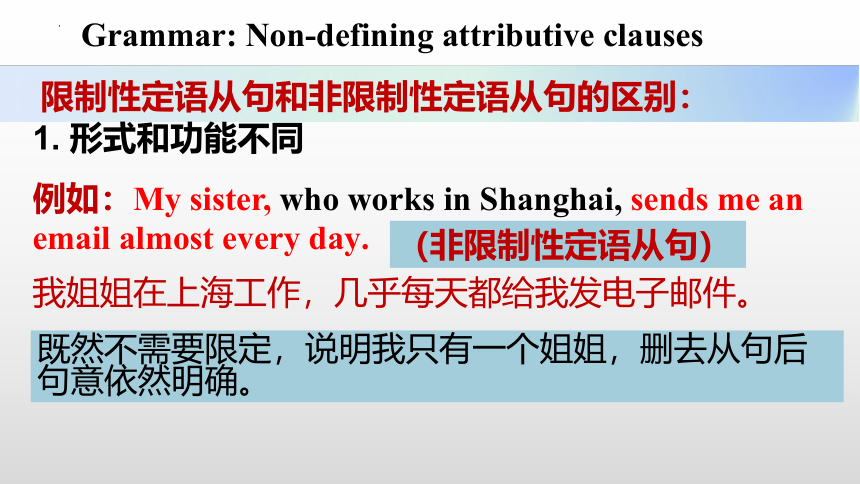
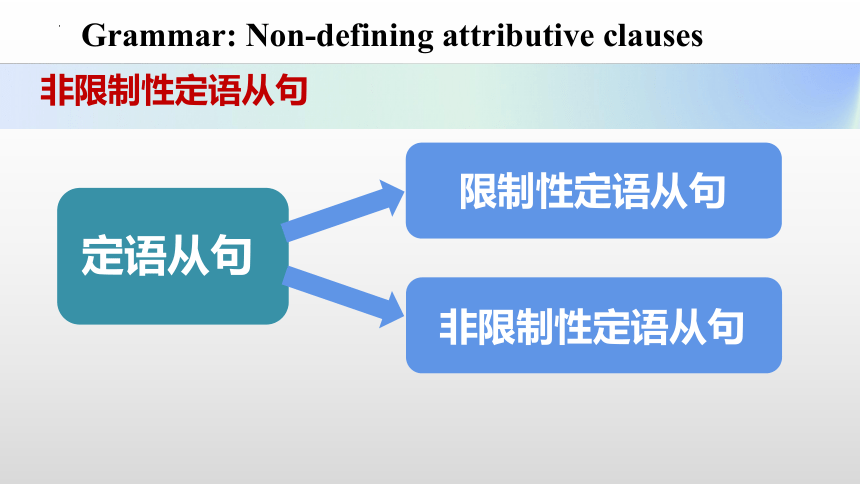
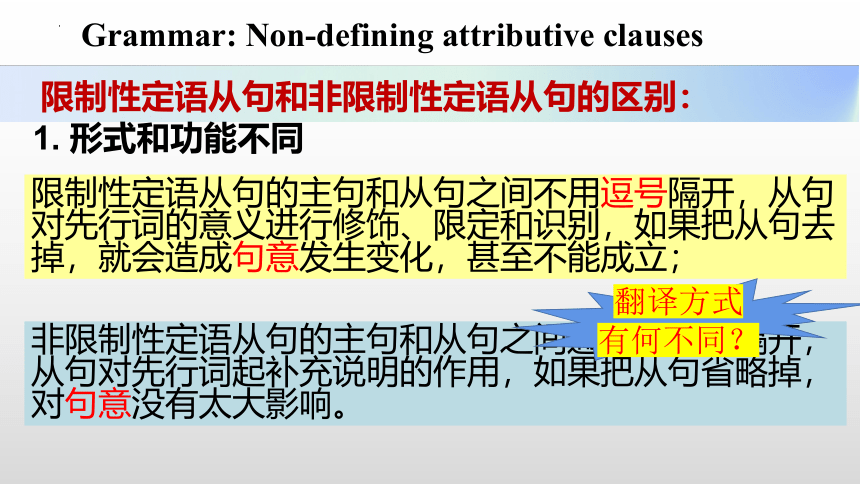
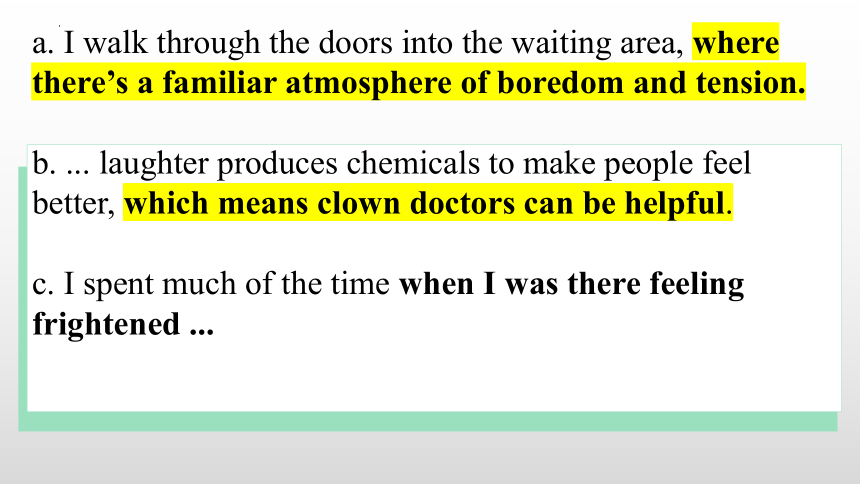
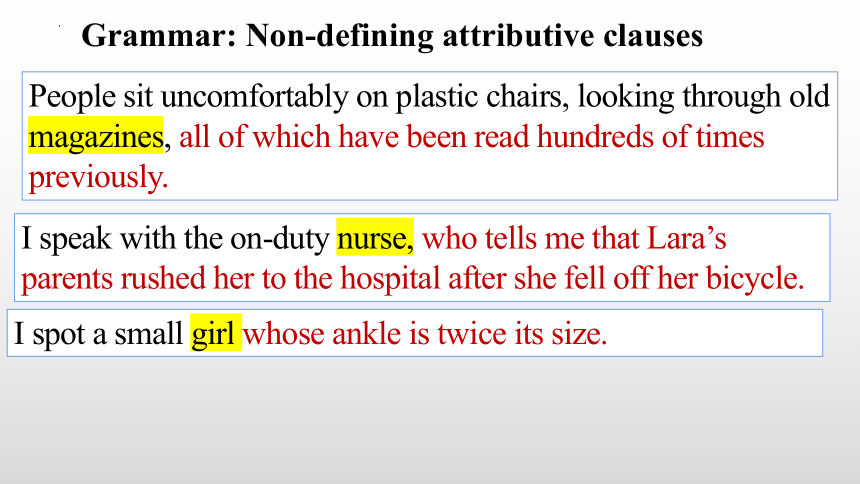
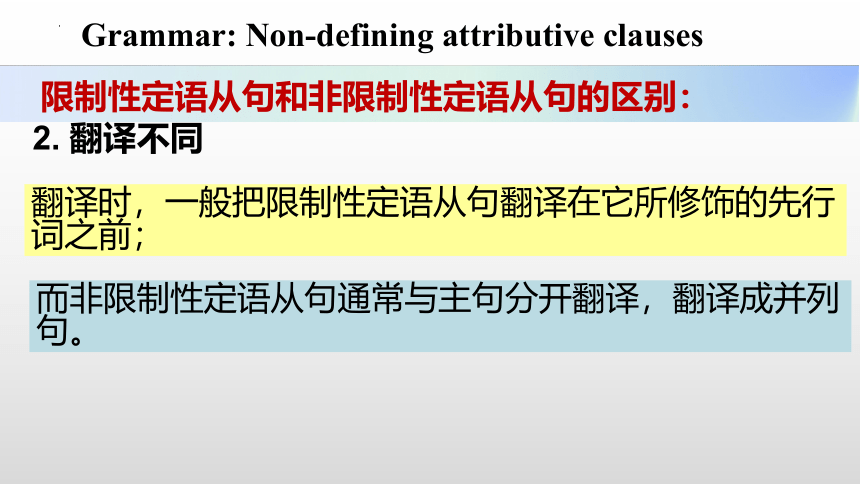
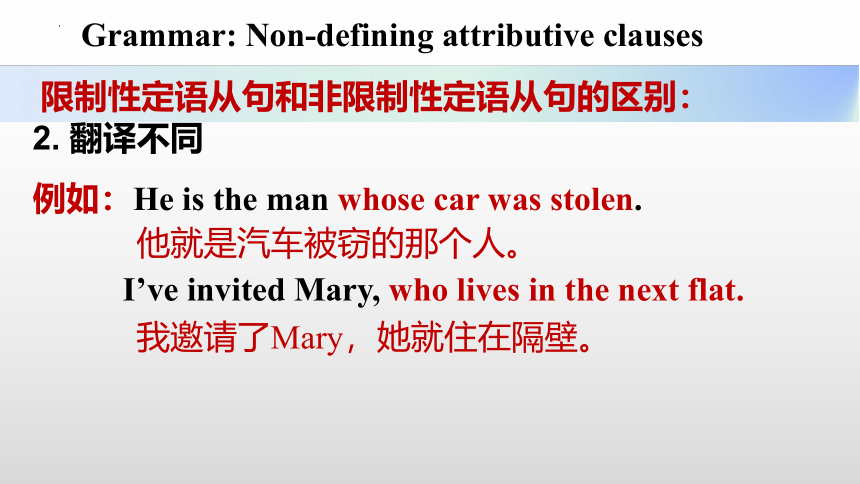
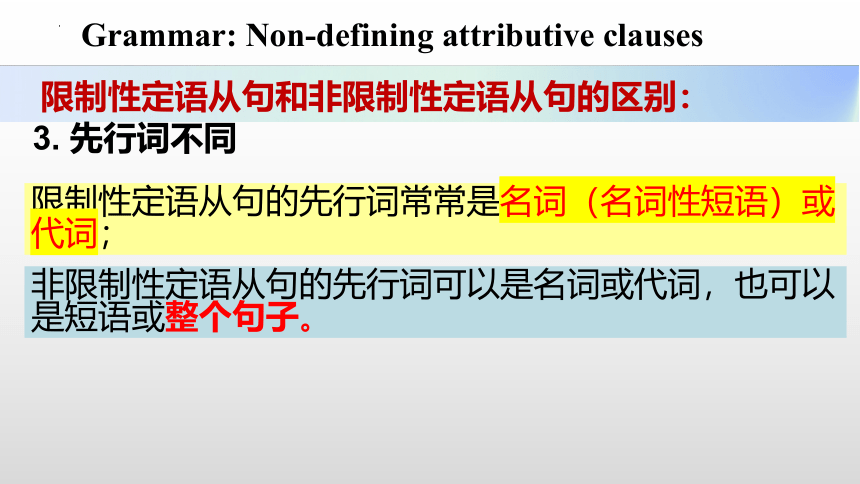
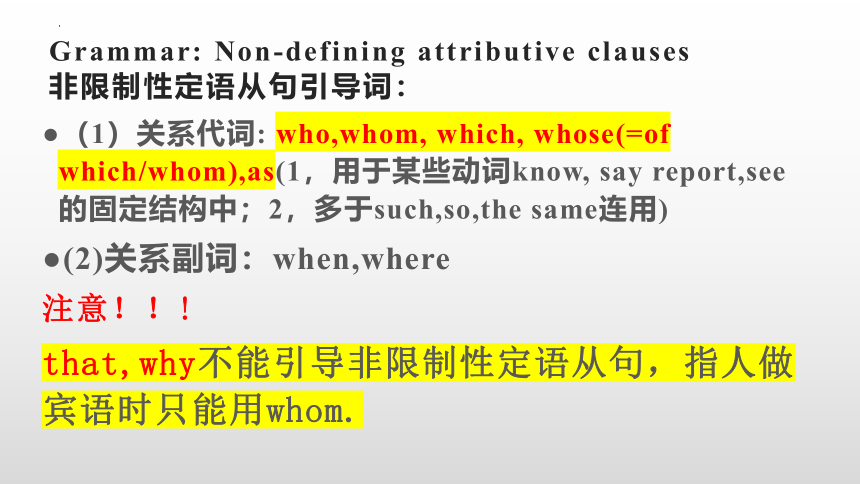
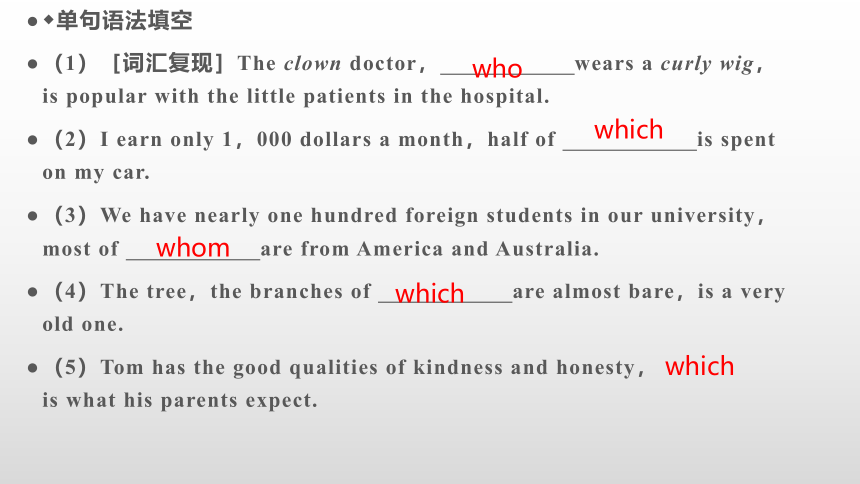
文档简介
(共35张PPT)
Using language
Unit 1 Laugh out loud!
Grammar: Non-defining attributive clauses
例如:My sister who works in Shanghai sends me an email almost every day.
既然需要限定,说明我的姐姐很多,除了在上海工作的姐姐,还有其他姐姐,删去后从句表意不明。
我在上海工作的姐姐几乎每天都给我发电子邮件。
(限制性定语从句)
限制性定语从句和非限制性定语从句的区别:
Grammar: Non-defining attributive clauses
1. 形式和功能不同
例如:My sister, who works in Shanghai, sends me an
email almost every day.
既然不需要限定,说明我只有一个姐姐,删去从句后句意依然明确。
我姐姐在上海工作,几乎每天都给我发电子邮件。
(非限制性定语从句)
非限制性定语从句
Grammar: Non-defining attributive clauses
定语从句
限制性定语从句
非限制性定语从句
限制性定语从句和非限制性定语从句的区别:
Grammar: Non-defining attributive clauses
1. 形式和功能不同
限制性定语从句的主句和从句之间不用逗号隔开,从句对先行词的意义进行修饰、限定和识别,如果把从句去掉,就会造成句意发生变化,甚至不能成立;
非限制性定语从句的主句和从句之间通常用逗号隔开,从句对先行词起补充说明的作用,如果把从句省略掉,对句意没有太大影响。
翻译方式有何不同?
0,000 people reading my blog! b I love to photograph the rising sun, …
a. I walk through the doors into the waiting area, where there’s a familiar atmosphere of boredom and tension.
b. ... laughter produces chemicals to make people feel
better, which means clown doctors can be helpful.
c. I spent much of the time when I was there feeling
frightened ...
Grammar: Non-defining attributive clauses
People sit uncomfortably on plastic chairs, looking through old magazines, all of which have been read hundreds of times previously.
I speak with the on-duty nurse, who tells me that Lara’s parents rushed her to the hospital after she fell off her bicycle.
I spot a small girl whose ankle is twice its size.
限制性定语从句和非限制性定语从句的区别:
Grammar: Non-defining attributive clauses
2. 翻译不同
翻译时,一般把限制性定语从句翻译在它所修饰的先行词之前;
而非限制性定语从句通常与主句分开翻译,翻译成并列句。
限制性定语从句和非限制性定语从句的区别:
Grammar: Non-defining attributive clauses
2. 翻译不同
例如:He is the man whose car was stolen.
他就是汽车被窃的那个人。
I’ve invited Mary, who lives in the next flat.
我邀请了Mary,她就住在隔壁。
限制性定语从句和非限制性定语从句的区别:
Grammar: Non-defining attributive clauses
3. 先行词不同
限制性定语从句的先行词常常是名词(名词性短语)或代词;
非限制性定语从句的先行词可以是名词或代词,也可以是短语或整个句子。
Grammar: Non-defining attributive clauses
非限制性定语从句引导词:
(1)关系代词: who,whom, which, whose(=of which/whom),as(1,用于某些动词know, say report,see的固定结构中;2,多于such,so,the same连用)
(2)关系副词:when,where
注意!!!
that,why不能引导非限制性定语从句,指人做宾语时只能用whom.
◆单句语法填空
(1)[词汇复现]The clown doctor, wears a curly wig,is popular with the little patients in the hospital.
(2)I earn only 1,000 dollars a month,half of is spent on my car.
(3)We have nearly one hundred foreign students in our university,most of are from America and Australia.
(4)The tree,the branches of are almost bare,is a very old one.
(5)Tom has the good qualities of kindness and honesty, is what his parents expect.
who
which
whom
which
which
Read the passage and rewrite the tips using non-defining attributive clauses. Add more tips to the list if you can.
Grammar: Non-defining attributive clauses
Achieving a positive state of mind isn’t easy for everyone. But there are ways to maintain a healthy mind even during times of difficulty.
SECRETS TO HAPPINESS
Go for a walk in the countryside. There you can enjoy the beautiful views and a peaceful atmosphere.
Spend time with your family and friends. This will activate chemicals in your brain to make you feel happier.
Try to accept your mistakes. You can learn a lot through them.
Close your eyes and picture the future. You’ve made your dreams come true.
Grammar: Non-defining attributive clauses
Go for a walk in the countryside, where you can enjoy the beautiful views and a peaceful atmosphere.
Spend time with your family and friends, which will activate chemicals in your brain to make you feel happier.
Try to accept your mistakes, where / through which you can learn a lot.
Close your eyes and picture the future, where you’ve made your dreams come true.
Grammar: Non-defining attributive clauses
has lost his patience by now
he thinks will impress Holmes
is lying next to him
he finds annoying
Complete the joke with the sentence parts in the box using who / which and put commas in the correct position.
Grammar: Non-defining attributive clauses
One day, Sherlock Holmes and Dr Watson go camping. They put up their tent under the stars and go to sleep. Suddenly, in the middle of the night, Watson is woken up by Holmes 1 ______________________ “Watson,” Holmes says, “look up at the stars, and tell me what they tell you.” Not quite sure what he means, Watson thinks Holmes is joking 2 ______________________ at this time of night.
who is lying next to him
which he finds annoying
Grammar: Non-defining attributive clauses
Even so, he replies, “I see millions of stars and it’s quite likely there are some planets like Earth. And if so, this means that there might also be life on other planets.” Watson is pleased with his answer 3 ________________________________. But Holmes 4 ____________________________ shouts, “Watson, look around you! Use your eyes! Somebody’s stolen our tent!”
who has lost his patience by now
which he thinks will impress Holmes
Vocabulary building
II
Vocabulary building: Fun time
Listen and complete the conversations.
Why are you grinning from 1 ____________
Cool! What are you going to watch
Yes! I laughed my 2 ___________. You’ll enjoy it!
I’ve won a free cinema ticket.
My Crazy Family. Have you seen it
ear to ear
head off
Vocabulary building: Fun time
Listen and complete the conversations.
I really don’t get Harry.
No. Today, he was all 3 _________.
He asked me to help him with that website
of his.
Well, I said yes. We all deserve a second chance, I guess.
Why Is he still not talking to you
Really What did you say
smiles
Vocabulary building: Fun time
Listen and complete the conversations.
What’s the matter Why the long face
That’s so funny!
Yesterday, I stepped on a banana skin and fell over in front of the whole class.
I was the 4 ____________ stock of the class. Even my teacher cracked 5 _____________!
laughing
a smile
Match the expressions you have completed in the above activity to their meanings.
Vocabulary building: Fun time
_______________: a person that everyone laughs at because they have done something funny or silly
_______________: to look friendly and happy, especially when other people are not expecting you to
________________: to look extremely happy because you are very pleased about something
________________: to smile slightly
________________: to laugh very loudly and for a long time
laughing stock
be all smiles
grin from ear to ear
crack a smile
laugh one’s head off
Now work in groups and think of more expressions about laughter.
Vocabulary building: Fun time
a good laugh
burst out laughing
fall about laughing
for laughs
have / get the last laugh
He who laughs last, laughs best.
哈哈大笑
放声大笑
忍不住大笑
为了取乐;作为消遣
笑到最后
笑到最后的人笑得最开心。
_______________________
_______________________
_______________________
_______________________
_______________________
_______________________
Vocabulary building: Fun time
giggle; laugh foolishly; simper
grin
smile at sb
smile bitterly
smirk
snicker; laugh up one’s sleeve
tease; make fun of
朝某人微笑
苦笑
幸灾乐祸地笑
窃笑
取笑
傻笑
咧着嘴笑
_______________
_______________
_______________
_______________
_______________
_______________
_______________
Work in pairs. Discuss other situations in which you could use these expressions.
You may start like this:
A: Tom must have passed that really hard test.
B: Why do you think so
A: Because he was grinning from ear to ear yesterday when I met him.
Vocabulary building: Fun time
III
Listening & speaking
Listening & speaking: Before listening
April Fool’s Day is on 1 April. It’s the one day of the year when people in many parts of the world play practical jokes on each other. Even newspapers, radio and TV stations play tricks on their readers and audiences. The jokes traditionally
last until noon in the UK. But in some other countries, such as the US, they can last all day!
Did You Know
Listening & speaking: While-listening
Listen to the radio programme and choose the pictures mentioned.
a
b
c
d
√
√
√
Listening & speaking: While-listening
Listen again and complete the notes.
Joke 1
Year: 1698
Main story: A newsletter reported people going to watch 1 _______________________ at the Tower of London. The joke was played on visitors throughout the 2 _______________________.
“the washing of the lions”
18th and 19th centuries
Listening & speaking: While-listening
Listen again and complete the notes.
Joke 2
Year: 3 _____________
Main story: The 4 __________________ introduced an invention called “Smellovision”. It allowed 5 __________________ over the airwaves.
smells to be carried
BBC News Channel
1965
Listening & speaking: While-listening
Listen again and complete the notes.
Joke 3
Year: 6 ____________
Main story: A news programme told viewers that the spaghetti trees in Switzerland were having 7 ______________________.
a really good harvest
1957
Complete the boxes with expressions from the radio programme.
Telling a story Making comments
Let’s start with ...
That’s so funny!
It’s a good one!
Now, my favourite one ...
I can imagine!
I don’t get it.
Listening & speaking: Post-listening
Listening & speaking: Pair work
Work in pairs. Tell each other a funny story
and make comments using the expressions in this section.
IV
Homework
Homework
Think of a joke you find funny and write it down using non-defining attributive clauses where appropriate. Then share your joke with the class.
Using language
Unit 1 Laugh out loud!
Grammar: Non-defining attributive clauses
例如:My sister who works in Shanghai sends me an email almost every day.
既然需要限定,说明我的姐姐很多,除了在上海工作的姐姐,还有其他姐姐,删去后从句表意不明。
我在上海工作的姐姐几乎每天都给我发电子邮件。
(限制性定语从句)
限制性定语从句和非限制性定语从句的区别:
Grammar: Non-defining attributive clauses
1. 形式和功能不同
例如:My sister, who works in Shanghai, sends me an
email almost every day.
既然不需要限定,说明我只有一个姐姐,删去从句后句意依然明确。
我姐姐在上海工作,几乎每天都给我发电子邮件。
(非限制性定语从句)
非限制性定语从句
Grammar: Non-defining attributive clauses
定语从句
限制性定语从句
非限制性定语从句
限制性定语从句和非限制性定语从句的区别:
Grammar: Non-defining attributive clauses
1. 形式和功能不同
限制性定语从句的主句和从句之间不用逗号隔开,从句对先行词的意义进行修饰、限定和识别,如果把从句去掉,就会造成句意发生变化,甚至不能成立;
非限制性定语从句的主句和从句之间通常用逗号隔开,从句对先行词起补充说明的作用,如果把从句省略掉,对句意没有太大影响。
翻译方式有何不同?
0,000 people reading my blog! b I love to photograph the rising sun, …
a. I walk through the doors into the waiting area, where there’s a familiar atmosphere of boredom and tension.
b. ... laughter produces chemicals to make people feel
better, which means clown doctors can be helpful.
c. I spent much of the time when I was there feeling
frightened ...
Grammar: Non-defining attributive clauses
People sit uncomfortably on plastic chairs, looking through old magazines, all of which have been read hundreds of times previously.
I speak with the on-duty nurse, who tells me that Lara’s parents rushed her to the hospital after she fell off her bicycle.
I spot a small girl whose ankle is twice its size.
限制性定语从句和非限制性定语从句的区别:
Grammar: Non-defining attributive clauses
2. 翻译不同
翻译时,一般把限制性定语从句翻译在它所修饰的先行词之前;
而非限制性定语从句通常与主句分开翻译,翻译成并列句。
限制性定语从句和非限制性定语从句的区别:
Grammar: Non-defining attributive clauses
2. 翻译不同
例如:He is the man whose car was stolen.
他就是汽车被窃的那个人。
I’ve invited Mary, who lives in the next flat.
我邀请了Mary,她就住在隔壁。
限制性定语从句和非限制性定语从句的区别:
Grammar: Non-defining attributive clauses
3. 先行词不同
限制性定语从句的先行词常常是名词(名词性短语)或代词;
非限制性定语从句的先行词可以是名词或代词,也可以是短语或整个句子。
Grammar: Non-defining attributive clauses
非限制性定语从句引导词:
(1)关系代词: who,whom, which, whose(=of which/whom),as(1,用于某些动词know, say report,see的固定结构中;2,多于such,so,the same连用)
(2)关系副词:when,where
注意!!!
that,why不能引导非限制性定语从句,指人做宾语时只能用whom.
◆单句语法填空
(1)[词汇复现]The clown doctor, wears a curly wig,is popular with the little patients in the hospital.
(2)I earn only 1,000 dollars a month,half of is spent on my car.
(3)We have nearly one hundred foreign students in our university,most of are from America and Australia.
(4)The tree,the branches of are almost bare,is a very old one.
(5)Tom has the good qualities of kindness and honesty, is what his parents expect.
who
which
whom
which
which
Read the passage and rewrite the tips using non-defining attributive clauses. Add more tips to the list if you can.
Grammar: Non-defining attributive clauses
Achieving a positive state of mind isn’t easy for everyone. But there are ways to maintain a healthy mind even during times of difficulty.
SECRETS TO HAPPINESS
Go for a walk in the countryside. There you can enjoy the beautiful views and a peaceful atmosphere.
Spend time with your family and friends. This will activate chemicals in your brain to make you feel happier.
Try to accept your mistakes. You can learn a lot through them.
Close your eyes and picture the future. You’ve made your dreams come true.
Grammar: Non-defining attributive clauses
Go for a walk in the countryside, where you can enjoy the beautiful views and a peaceful atmosphere.
Spend time with your family and friends, which will activate chemicals in your brain to make you feel happier.
Try to accept your mistakes, where / through which you can learn a lot.
Close your eyes and picture the future, where you’ve made your dreams come true.
Grammar: Non-defining attributive clauses
has lost his patience by now
he thinks will impress Holmes
is lying next to him
he finds annoying
Complete the joke with the sentence parts in the box using who / which and put commas in the correct position.
Grammar: Non-defining attributive clauses
One day, Sherlock Holmes and Dr Watson go camping. They put up their tent under the stars and go to sleep. Suddenly, in the middle of the night, Watson is woken up by Holmes 1 ______________________ “Watson,” Holmes says, “look up at the stars, and tell me what they tell you.” Not quite sure what he means, Watson thinks Holmes is joking 2 ______________________ at this time of night.
who is lying next to him
which he finds annoying
Grammar: Non-defining attributive clauses
Even so, he replies, “I see millions of stars and it’s quite likely there are some planets like Earth. And if so, this means that there might also be life on other planets.” Watson is pleased with his answer 3 ________________________________. But Holmes 4 ____________________________ shouts, “Watson, look around you! Use your eyes! Somebody’s stolen our tent!”
who has lost his patience by now
which he thinks will impress Holmes
Vocabulary building
II
Vocabulary building: Fun time
Listen and complete the conversations.
Why are you grinning from 1 ____________
Cool! What are you going to watch
Yes! I laughed my 2 ___________. You’ll enjoy it!
I’ve won a free cinema ticket.
My Crazy Family. Have you seen it
ear to ear
head off
Vocabulary building: Fun time
Listen and complete the conversations.
I really don’t get Harry.
No. Today, he was all 3 _________.
He asked me to help him with that website
of his.
Well, I said yes. We all deserve a second chance, I guess.
Why Is he still not talking to you
Really What did you say
smiles
Vocabulary building: Fun time
Listen and complete the conversations.
What’s the matter Why the long face
That’s so funny!
Yesterday, I stepped on a banana skin and fell over in front of the whole class.
I was the 4 ____________ stock of the class. Even my teacher cracked 5 _____________!
laughing
a smile
Match the expressions you have completed in the above activity to their meanings.
Vocabulary building: Fun time
_______________: a person that everyone laughs at because they have done something funny or silly
_______________: to look friendly and happy, especially when other people are not expecting you to
________________: to look extremely happy because you are very pleased about something
________________: to smile slightly
________________: to laugh very loudly and for a long time
laughing stock
be all smiles
grin from ear to ear
crack a smile
laugh one’s head off
Now work in groups and think of more expressions about laughter.
Vocabulary building: Fun time
a good laugh
burst out laughing
fall about laughing
for laughs
have / get the last laugh
He who laughs last, laughs best.
哈哈大笑
放声大笑
忍不住大笑
为了取乐;作为消遣
笑到最后
笑到最后的人笑得最开心。
_______________________
_______________________
_______________________
_______________________
_______________________
_______________________
Vocabulary building: Fun time
giggle; laugh foolishly; simper
grin
smile at sb
smile bitterly
smirk
snicker; laugh up one’s sleeve
tease; make fun of
朝某人微笑
苦笑
幸灾乐祸地笑
窃笑
取笑
傻笑
咧着嘴笑
_______________
_______________
_______________
_______________
_______________
_______________
_______________
Work in pairs. Discuss other situations in which you could use these expressions.
You may start like this:
A: Tom must have passed that really hard test.
B: Why do you think so
A: Because he was grinning from ear to ear yesterday when I met him.
Vocabulary building: Fun time
III
Listening & speaking
Listening & speaking: Before listening
April Fool’s Day is on 1 April. It’s the one day of the year when people in many parts of the world play practical jokes on each other. Even newspapers, radio and TV stations play tricks on their readers and audiences. The jokes traditionally
last until noon in the UK. But in some other countries, such as the US, they can last all day!
Did You Know
Listening & speaking: While-listening
Listen to the radio programme and choose the pictures mentioned.
a
b
c
d
√
√
√
Listening & speaking: While-listening
Listen again and complete the notes.
Joke 1
Year: 1698
Main story: A newsletter reported people going to watch 1 _______________________ at the Tower of London. The joke was played on visitors throughout the 2 _______________________.
“the washing of the lions”
18th and 19th centuries
Listening & speaking: While-listening
Listen again and complete the notes.
Joke 2
Year: 3 _____________
Main story: The 4 __________________ introduced an invention called “Smellovision”. It allowed 5 __________________ over the airwaves.
smells to be carried
BBC News Channel
1965
Listening & speaking: While-listening
Listen again and complete the notes.
Joke 3
Year: 6 ____________
Main story: A news programme told viewers that the spaghetti trees in Switzerland were having 7 ______________________.
a really good harvest
1957
Complete the boxes with expressions from the radio programme.
Telling a story Making comments
Let’s start with ...
That’s so funny!
It’s a good one!
Now, my favourite one ...
I can imagine!
I don’t get it.
Listening & speaking: Post-listening
Listening & speaking: Pair work
Work in pairs. Tell each other a funny story
and make comments using the expressions in this section.
IV
Homework
Homework
Think of a joke you find funny and write it down using non-defining attributive clauses where appropriate. Then share your joke with the class.
